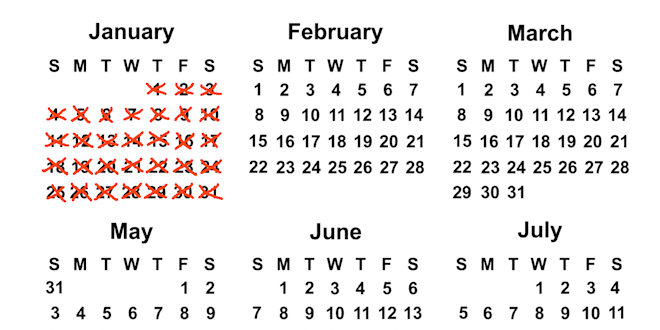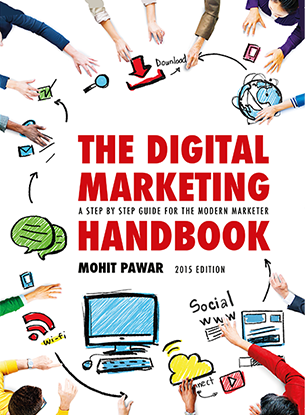
The other day I woke up at 4.40am.
I ended up working for good 4-5 hours and did a lot. I finished everything I wanted to do that day. Later I worked out for one hour, ate a leisurely breakfast and had a ton of fun. I felt good and was happy throughout.
This was not the only time when I got up early and accomplished a lot. I do it on and off.
Before winters kicked in, every day I woke up early to write before breakfast. A walk in the morning chill set me up for a good day of creation.
Whenever I get up early and put my head to what I want to do I end up accomplishing a lot. Only if I stick to waking up that early every single day. I am fine with waking up at 6 am in summers. Earlier than that is still tough for me. I have not stopped trying tough.
There are other habits that I have been able to stick to. Like quitting tea and not touching it again for 5 years. A 1200 days meditation streak. That is meditating every day for 30 minutes or more for more than 3 years without missing even a single day.
These habits have served me well with wins in other areas of life.
Here is what has worked for me in my quest to create new habits and stick with them.
1) START SMALL
Deciding to run 5km tomorrow after not moving your butt for 5 years is a bad idea.
Even if you try it chances are you’ll end up hurting yourself.
A better way is to give yourself time and space. It is ok to set a big goal set sometime in future. You can set a goal to run a 5k or even a marathon in 6 months or a year. Start with going for 5 minute walks every day. In one month you can go up to 10 minutes. Then add 1-minute running time every other day. Soon you’ll be running for 15 minutes a day.
This is how I started my meditation practice. 5 minutes a day, and then rather quickly I moved to 5 minutes each in the morning and before sleeping at night. Then took it up to 30 minutes a day with hour-long meditation sessions in between. I never pushed myself to do more than I wanted to.
Change is painful. When you start small you trick your brain into thinking that gains by continuing your habit will be more than small discomfort. After some time, if you stick to it, you’ll form a new habit. It will become part of your life and you will able to continue with it without experiencing any discomfort. You’ll do it without thinking about it. That’s when it becomes a habit.
2) DO NOT BREAK THE CHAIN
Jerry Seinfeld is known as one the Greatest Stand-up Comedian of All Time. He has consistently been among the highest paid comedians in the world making as much as $100 million in a single year.
He is also the proponent of “break the chain” productivity method.
Seinfeld explained his method for success to another stand-up comic who was trying to learn the ropes: Each January, he got a big wall calendar where he could see whole year on one page. For every day he wrote new jokes, he put a big red X over that day. After a few days, he had a chain with X after X. He liked looking at that chain and made sure that he didn’t break it.
His success relied on writing new jokes. Your success will likely come from doing something else. Do that, mark your X once you do it and don’t break the chain.
You can get yourself a PDF to print for this year here, and plot your success story there.
Whatever you decide to do, be at it. In early days trick is to not break the chain even on weekends. Even if you have to break the chain for travel or health reasons make sure to not skip two days in a row. When I went about establishing my meditation practice – I made sure that I didn’t miss it even when I was traveling. I remember meditating on my way to the airport and late at night in my bed. I made it non-negotiable. It did the trick. I was able to do it and see its positive effects in other areas of my life.

3) FIND YOUR SUPPORT SYSTEM
You can work with a coach, a mentor or get an accountability partner. To do it on your own, document your progress every day and review it once a week. You can do it with a spreadsheet on your phone or a printed sheet posted on your wall.
4) START WITH A HABIT THAT WILL HELP YOU MOVE TOWARDS A BIG GOAL
Waking up early just for the sake of it is not motivating enough. If you wake up early because you want to finish one big task first thing in the morning it will be more exciting and chances are that you’ll stick to it.
Link your new habit to your big why, a big reason for doing it. Your big why can be a healthy body, a calm mind, more fame, more love in your life or a bigger business. You choose.
5) JUST DO IT
Don’t overthink. If you feel your new habit will help you move forward then act on it whenever you decide to do it. Waiting and thinking will make you anxious and increase your chances of not doing it.
6) FIND YOUR KEYSTONE HABITS
Charles Duhigg discussed the idea of keystone habits in his book “The Power of Habit”.
Keystone habits are related to other habits. When you practice a keystone habit you’ll see its impact in other areas of your life. For me, meditation is my keystone habit. Meditation makes me calm. I am able to focus well and go through my day with a sense of ease.
Exercise is another keystone habit. It affects your energy levels, your confidence, and your focus. Eventually, all this can help you accomplish more, be more satisfied and more successful.
7) CHANGE YOUR ENVIRONMENT TO CHANGE YOUR HABITS
Clean your kitchen and fridge of junk if you are trying to get healthy. Keep a notebook handy if you are trying to get into journaling and writing. Keep a water bottle close if you want to drink enough water. Switch off wifi if you want to work distraction free. Keep your phone in your pocket if you want to practice mindfulness and being present with another person,
Think what change you can make in your environment to change a habit or create a new habit.
8) STACK YOUR NEW HABIT ON TOP OF A HABIT THAT YOU ALREADY HAVE
I meditate almost every day because I do it as soon as I wake up.
I do it even before I am fully awake.
I get up, drink a glass or two of water, splash water on my face and get back to sit in my bed to meditate. Making your bed can wait. Plugging your phone for charging can wait. For years I did it in bed where I slept. These days I get up to go to another room and do it in a bed there.
I wake up every single day. So, it is tough to skip meditation because I have stacked it on top of waking up. I meditate without even thinking as something I do right after I get up.
You can do a habit right after you brush your teeth or take a bath. Chances are you open your laptop every day. You can open a doc and write 50 words every day as soon as you open it. Soon enough you’ll do it without thinking about it.
9) LEARN FROM THOSE WHO HAVE DONE IT EARLIER
Whatever you want to do someone else has already done it. Search for those who have shared their experience, find a path in what they have shared and do it. It is better than making mistakes and failing at it before succeeding. Our time is limited so it is good to be efficient.
10) KNOW THAT IT IS NEVER TOO LATE
It doesn’t matter if you did not start your new habit on Jan 1st. It is ok to start whenever you find your reason to do it. None of my big habit changes came on Jan 1st. I am fine with it. Do not wait for a new year to start a new habit. Beginning, middle or end of a year are all ok. Today is the best day.
11) DON’T GIVE IN TO SMALL TEMPTATIONS
You will be tempted to stop after you start doing something important. At times there will be genuine reasons like lack of time or sickness. If these are minor then find ways to work through them. It is doable if your habits and goals are important to you.

Remember Rome wasn’t built in a day. Tell yourself that you’ll stick to your habit for today. Then stick to it the next day. Soon you would have done it for a week, then a month and then a year. Chances are by then your new habit will be part of your life.
Phillippa Lally, a health psychology researcher at University College London, conducted a study on new habit formation. This study concluded that it takes more than 2 months (66 days to be exact) for a new behavior to become automatic. How long it takes varies based on a person’s behavior and circumstances. In some cases, it may take up to 254 days. Least a person took to form a habit was 18 days.
What’s your plan? Will you stick to it however long it takes?
Which new habit do you want to create?



Pingback: TIME: Turning Waste Into Surplus - Mohit Pawar.com
Pingback: Watch Out for Bouts of Procrastination - Mohit Pawar.com
Pingback: What If It Were Easy? - The Simple Question to Make Life Easy - Mohit Pawar.com
Pingback: How to Develop a Reading Habit - Mohit Pawar.com